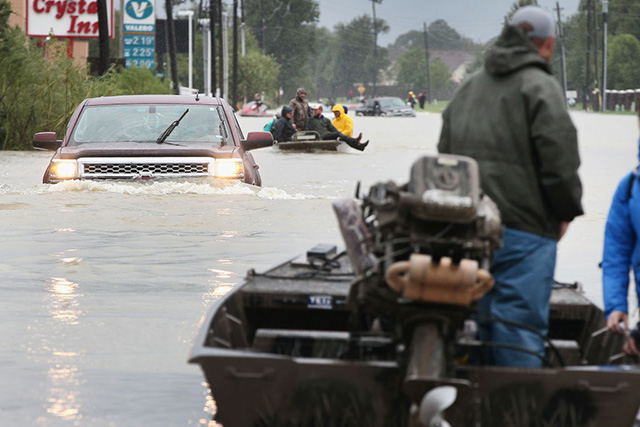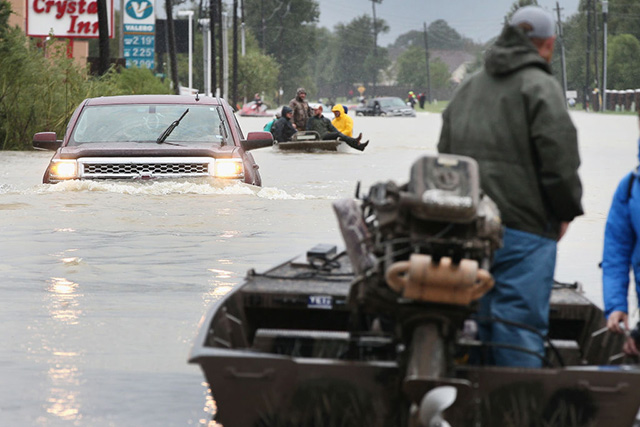
 Rescue workers and volunteers help residents make their way out of a flooded neighborhood after it was inundated with rain water following Hurricane Harvey on August 29, 2017, in Houston, Texas. Harvey, which made landfall north of Corpus Christi August 25, has dumped nearly 50 inches of rain in and around areas of Houston. (Photo: Scott Olson / Getty Images)
Rescue workers and volunteers help residents make their way out of a flooded neighborhood after it was inundated with rain water following Hurricane Harvey on August 29, 2017, in Houston, Texas. Harvey, which made landfall north of Corpus Christi August 25, has dumped nearly 50 inches of rain in and around areas of Houston. (Photo: Scott Olson / Getty Images)
US corporate media outlets regularly fail to inform the public on the danger of continuing to burn fossil fuels, and they have repeated this failure with their reporting on Hurricane Harvey.
Every major Sunday morning talk show airing on August 27 failed to discuss Harvey in the context of climate change, despite scientific consensus on the role of global warming in driving extreme weather events.
Corporate print media also did a dismal job connecting the extreme weather of Harvey with climate change. From the start of the storm on August 17 to August 29, the 54 most widely read US newspapers — including The Washington Post, The New York Times and USA Today — had published roughly a dozen articles on Harvey, in print or online, which discussed the connection between hurricanes and global warming.
A grand total of two articles mentioned fossil fuels, and not a single editorial board took a position on this climate-killing industry.
Guests appearing on CBS’s “Face the Nation” and NBC’s “Meet the Press” discussed the situation in Houston, the local and federal response to the disaster, but did not question the wisdom of allowing the oil, gas and coal industries to continue business as usual. The segments also neglected to mention the fact that the US military is the world’s biggest institutional consumer of fossil fuels.
While cable TV ignored the issue of climate change, most of the few print articles that appeared either mentioned it as a mere detail or ignored the question of the fossil fuel industry.
An article in USA Today (an op-ed) mentioning both global warming and Harvey implored Trump to “use the bully pulpit to prepare a new generation for this new normal,” but ignored the prospects for avoiding the worst consequences through curbing greenhouse gas emissions.
The Washington Post editorial board urged us to take up the question of “to what degree superstorms are being made even more frequent and ferocious by global climate change” and future planning to prevent climate-related disasters, but did not call for a fight against its driving force — carbon-based pollution.
A writer for the St. Louis Post Dispatch warned us about climate change denial in the narrow terms of a failure “to plan for floods” but entirely neglected to discuss the literal climate change denial of President Trump and other members of his administration, who have green-lighted the Dakota Access pipeline. Meanwhile, the insufficient climate proposals put forth by Democrats should also not escape this criticism; the insufficiency of these efforts has been described by one science educator as a form of denial itself.
In the Boston Globe, an op-ed condemned Trump for harming scientific research on climate change but made no mention of his withdrawal of the US from the necessary (albeit imperfect) United Nations Framework Convention on Climate Change treaty.
A New York Times article admitted storms are getting “wetter” (an understatement), and described climate change as one factor among several influencing the severity of Hurricane Harvey. Yet the article’s attempt to stress the uncertainty of climate change’s role in influencing hurricanes without providing space for the unambiguous conclusions of climate scientists (including one whom it cited) runs the risk of reinforcing skepticism in the public (of which 38 percent erroneously believes global warming has not yet begun to affect the planet, according to recent polling).
Take Kenneth Kunkel, a climate researcher whom the New York Times article mentioned and who co-authored parts of the National Climate Assessment. The report released by the federal government in 2014 found an increase in heavy precipitation in the United States since the 1950s and made the following unambiguous statement about the connection to climate change:
The mechanism driving these changes is well understood. Warmer air can contain more water vapor than cooler air. Global analyses show that the amount of water vapor in the atmosphere has in fact increased due to human-caused warming. This extra moisture is available to storm systems, resulting in heavier rainfalls.
One has to be careful neither to overstate nor mystify the state of scientific knowledge on the connection between global warming, weather and human activity. It is true that many scientists are unwilling to link an extreme weather event to climate change, and rightly so: Statistical trends are not established by single data points. However, the same report notes a clear connection despite the need for further research on the extent of human impact:
The intensity, frequency, and duration of North Atlantic hurricanes, as well as the frequency of the strongest (Category 4 and 5) hurricanes, have all increased since the early 1980s. The relative contributions of human and natural causes to these increases are still uncertain. Hurricane-associated storm intensity and rainfall rates are projected to increase as the climate continues to warm.
The UN Climate Change Conference in Bonn, Germany, is only three months away. Calls for adaptation are necessary but not sufficient. We should all be concerned about the marginalization of global warming and fossil fuels in corporate media’s reporting on this catastrophic hurricane.
Trump is silencing political dissent. We appeal for your support.
Progressive nonprofits are the latest target caught in Trump’s crosshairs. With the aim of eliminating political opposition, Trump and his sycophants are working to curb government funding, constrain private foundations, and even cut tax-exempt status from organizations he dislikes.
We’re concerned, because Truthout is not immune to such bad-faith attacks.
We can only resist Trump’s attacks by cultivating a strong base of support. The right-wing mediasphere is funded comfortably by billionaire owners and venture capitalist philanthropists. At Truthout, we have you.
Our fundraising campaign is over, but we fell a bit short and still need your help. Please take a meaningful action in the fight against authoritarianism: make a one-time or monthly donation to Truthout. If you have the means, please dig deep.